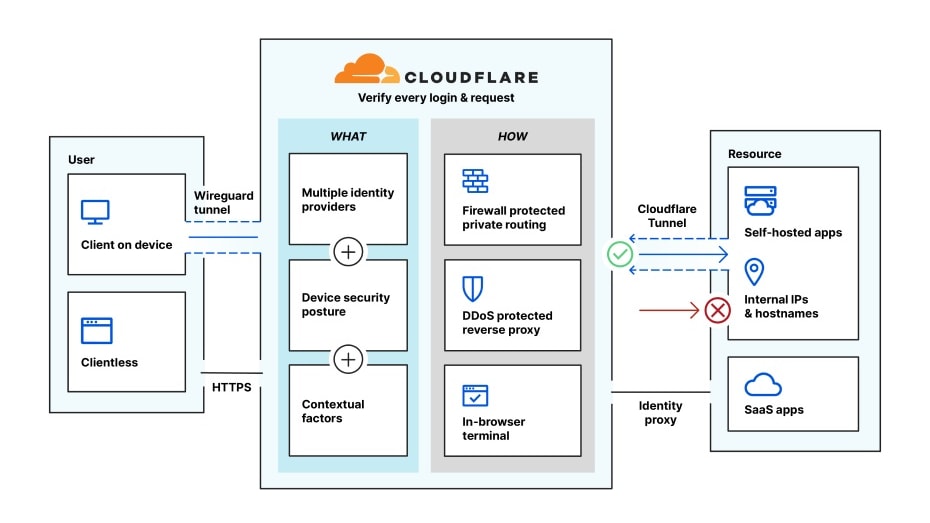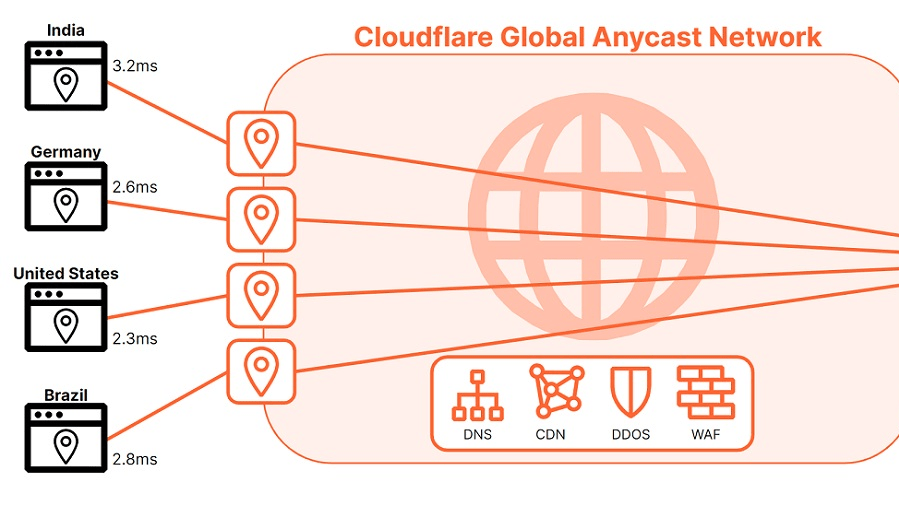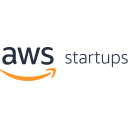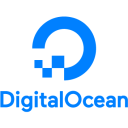Cloudflare vs GoDaddy: Which is the best DNS and domain registrar?
- 01Cloudflare vs GoDaddy: overview
- 02What's the difference between Cloudflare and GoDaddy?
- 03Cloudflare pros and cons
- 04GoDaddy pros and cons
- 05Cloudflare compared to GoDaddy
- 06GoDaddy compared to Cloudflare
- 07Features comparison
- 08Cloudflare vs GoDaddy: Which is the best for your business?
- 09Promotions on Security software
- 10Alternatives to Cloudflare & GoDaddy
Access up to $250,000 savings on Cloudflare & $1,000 on GoDaddy
Access up to $250,000 savings on Cloudflare & $1,000 on GoDaddy
Web security and performance are essential for any online business. Ensuring that your website is both fast and secure can directly impact user experience and conversions. With the rise in cyber threats, it's even more crucial to protect your site from potential attacks.
Fortunately, there are several web performance and security solutions available. We've compared two of the most renowned players in this domain—Cloudflare vs GoDaddy—analyzing their key features, differences, and use cases. By the end of this article, you'll have all the information you need to choose the right platform for your website's needs.
Cloudflare vs GoDaddy: overview
Cloudflare and GoDaddy emerge as two major contenders in the realm of web performance and security, each offering unique advantages tailored to cater to specific user needs.
Cloudflare is highly respected for its cutting-edge content delivery network (CDN) and web security services. It's designed to enhance website speed, optimize performance, and provide robust protection against a myriad of online threats. This makes it particularly favored among businesses that prioritize website uptime and security. On the flip side, GoDaddy, primarily known as a domain registrar and hosting provider, also offers a suite of web security and performance solutions. Besides hosting, GoDaddy provides features like SSL certificates, website backups, and security monitoring.
To make a well-informed decision between Cloudflare and GoDaddy, one must evaluate their specific website needs, audience, and objectives. Cloudflare might be the go-to for businesses that require advanced security and superior website performance, whereas GoDaddy can be a one-stop shop for businesses that seek an all-encompassing solution, from domain registration to website hosting and security.
What's the difference between Cloudflare and GoDaddy?


Cloudflare and GoDaddy have pretty different target audiences. GoDaddy is mostly known for its domain registrar, but it can also help you host, build a site, and even improve its speed with a CDN. Conversely, Cloudflare is mostly known for its CDN, and its ability to speed up your site. However, the latter also offers domain registration.
In theory, you can use both. You can host your domain and build your site on GoDaddy, while also using Cloudflare’s CDN. But there’s no reason to be paying for both, so which one should you pick?
GoDaddy has a lot of disgruntled former users that swear you should switch to any other registrar as soon as possible. We didn’t have an abysmal experience with GoDaddy, but if you care about a tool’s overall reviews, GoDaddy’s not looking good.
The chief complaints people have with GoDaddy are its constant upsells, and lacking customer support. In our testing, we also found that its CDN is not as effective as Cloudflare’s, and GoDaddy’s DNS settings are harder to access.
Conversely, if you pick Cloudflare you won’t get as many options for domain registration. You also won’t have any tools to build your site, but Cloudflare integrates pretty well with WordPress, so that’s not a worry for most people.
Plus, Cloudflare has stellar reviews across all aggregators, and an ever-growing toolstack. It’s also very easy to migrate to, and easier to use for some things (like changing DNS settings). And although its paid plan is more expensive than GoDaddy, its free plan is pretty good to get started.
GoDaddy might be a good option if WordPress didn’t exist. But since Cloudflare integrates so well with it, and it doesn’t have any markup on its domain registration, that’s our recommendation.
Cloudflare pros and cons
What are the advantages of Cloudflare?
- Content delivery network (CDN): Cloudflare's vast global network accelerates the loading time of websites by caching content and serving it from the nearest data center to the end user.
- Web security: Cloudflare provides robust protection against threats like DDoS attacks, SQL injection, and cross-site scripting. It can identify and block malicious traffic in real-time.
- Always Online™ technology: Even if your hosting provider goes down, Cloudflare's Always Online™ keeps a cached version of your site up so visitors still get content.
- Flexible SSL encryption: Cloudflare offers free SSL certificates, helping websites to be secure and boosting their SEO ranking.
- Traffic and performance analytics: Users get insights into their website's traffic, threats, search engine crawlers, and more, which can be crucial for optimization and decision-making.
What are the disadvantages of Cloudflare?
- Cache purging: Sometimes, Cloudflare can hold onto cached content for longer than desired, causing outdated content to be served to users.
- Potential for false positives: Cloudflare's aggressive security measures can sometimes mistakenly block or challenge legitimate users, thinking they are threats.
- Complex configuration for advanced features: While basic setup is user-friendly, some advanced features require a deeper understanding and can be tricky to configure correctly.
- Limited support on free plans: Users on the free plan may find that they don't get as prompt or detailed support as they might like in case of issues.
- Potential for mixed content warnings: When implementing Cloudflare's SSL, websites might sometimes face mixed content warnings if they have both secure and non-secure content.
Compare Cloudflare to other tools
GoDaddy pros and cons
What are the advantages of GoDaddy?
- One-stop shop: GoDaddy offers a range of services from domain registration, web hosting, website builders, to SSL certificates, making it convenient for businesses to manage multiple aspects of their online presence in one place.
- User-friendly interface: Especially for beginners, GoDaddy provides a straightforward and easy-to-use platform for domain management and other services.
- Affordable initial pricing: GoDaddy often has promotional prices for the first year of domain registration or hosting, making it attractive for newcomers to get started.
- 24/7 customer support: GoDaddy offers round-the-clock phone and live chat support, which can be beneficial for users who might run into issues at any time.
- Large selection of domain extensions: GoDaddy offers a wide variety of domain name extensions, giving businesses plenty of options when choosing a domain name.
What are the disadvantages of GoDaddy?
- Upselling tactics: GoDaddy often tries to upsell additional services during the checkout process, which can be confusing or overwhelming for some users.
- Price increases on renewal: While initial prices can be low, renewal rates for domains and hosting can be significantly higher.
- Performance consistency: Some users report inconsistent website loading speeds and occasional downtimes with GoDaddy's hosting services.
- Limitations on cheaper plans: Basic hosting plans might come with restrictions in terms of bandwidth, storage, or features, necessitating upgrades for growing websites.
- Controversial past: GoDaddy has faced criticism over past advertising campaigns and actions of its former CEO, which some users might find off-putting.
Compare GoDaddy to other tools
Cloudflare compared to GoDaddy
Cloudflare and GoDaddy serve distinct primary roles in the digital ecosystem, with some overlap. Cloudflare, renowned for its global Content Delivery Network (CDN) and advanced web security features, specializes in accelerating and protecting websites. Its infrastructure guards against threats like DDoS attacks while ensuring rapid content delivery.
GoDaddy, on the other hand, is chiefly recognized as a domain registrar and hosting provider, offering end-to-end solutions for businesses to establish their online presence. While both companies provide SSL certificates and security measures, the choice between them often hinges on whether one prioritizes specialized web performance and security or a holistic web service solution.
Is Cloudflare better than GoDaddy?
Whether Cloudflare is better than GoDaddy depends on the specific needs of a user. Cloudflare excels in web performance and security, boasting a vast Content Delivery Network (CDN) that enhances site speed and offers robust protection against online threats. GoDaddy, predominantly known as a domain registrar and hosting provider, offers comprehensive solutions for businesses to establish and manage their online presence.
While Cloudflare is a top choice for those prioritizing website acceleration and security, GoDaddy appeals to those seeking an all-in-one platform for domain, hosting, and foundational web services. Individual requirements and goals will dictate the best fit.
What is Cloudflare best used for?
Cloudflare is best used for optimizing web performance and enhancing website security. With its expansive Content Delivery Network (CDN), it accelerates website loading times by caching content and delivering it from the nearest data center to the end-user.
Beyond speed enhancement, Cloudflare offers robust protection against a range of online threats, including DDoS attacks, SQL injection, and cross-site scripting. Its suite of tools, such as flexible SSL encryption and Web Application Firewall (WAF), ensures that websites remain secure and performant. Businesses prioritize Cloudflare when they seek a blend of rapid content delivery and top-tier online security measures.
Can Cloudflare replace GoDaddy?
Cloudflare and GoDaddy cater to different core aspects of the web industry. While Cloudflare is renowned for its Content Delivery Network (CDN) and advanced security services, its primary focus is on accelerating and safeguarding web traffic. GoDaddy, in contrast, is a comprehensive platform known for domain registration, web hosting, and other foundational web services.
Although Cloudflare offers domain registration and some hosting-related services, it doesn't provide the full suite that GoDaddy does. So, while Cloudflare can complement or enhance certain aspects provided by GoDaddy, it cannot entirely replace the breadth of services that GoDaddy offers to website owners.
Is Cloudflare cheaper than GoDaddy?
Comparing Cloudflare and GoDaddy purely on cost can be tricky, as they serve different primary functions. Cloudflare’s pricing offers a free tier for its CDN and basic security features, which many users find valuable. However, when delving into advanced features, there might be associated costs. GoDaddy's primary services like domain registration and hosting come with specific pricing, which can sometimes include promotional deals.
When considering advanced security and performance features on GoDaddy, additional costs arise. Overall, while Cloudflare's basic CDN and security services might be more cost-effective, a direct comparison is challenging due to the distinct services each platform primarily provides.
Is there a better Security software than Cloudflare?
While Cloudflare boasts a comprehensive suite of features tailored for web performance and security, it's wise to examine other software options in this domain to ensure you land the optimal solution for your distinct needs.
Several notable alternatives to Cloudflare in the web performance and security sector include Akamai, Fastly, Sucuri, Google Cloud CDN, Microsoft Azure CDN, and Imperva Incapsula.
The choice of the ideal web performance and security software depends on your website's unique demands, priorities, and objectives. If you're looking for a platform celebrated for its expansive Content Delivery Network (CDN), advanced security measures, and website optimization, Cloudflare may resonate seamlessly with your goals.
$250,000 in credits for 1 year on Cloudflare
Get $250,000 in credits for 1 year on Cloudflare and up to $250,000 savings with Secret.
GoDaddy compared to Cloudflare
GoDaddy and Cloudflare occupy different niches in the digital landscape, though there's some overlap in their services. GoDaddy, originally established as a domain registrar, has expanded its offerings to include web hosting, website builders, and foundational online services. Its comprehensive solutions cater to businesses initiating their online journey.
Cloudflare, on the other hand, emphasizes web performance and security. With its vast Content Delivery Network (CDN), it ensures swift website loading and robust protection against online threats. When businesses consider between the two, GoDaddy's appeal lies in its holistic web services, while Cloudflare stands out for performance and security enhancements.
Is GoDaddy better than Cloudflare?
Whether GoDaddy is better than Cloudflare hinges on the user's specific needs. GoDaddy is a comprehensive platform offering domain registration, web hosting, and an array of tools for establishing an online presence. It's well-suited for newcomers wanting a centralized solution for their digital footprint. Cloudflare, meanwhile, specializes in web performance and security. With its extensive Content Delivery Network (CDN) and security measures, it's a top choice for enhancing website speed and safeguarding against threats.
So, while GoDaddy is favorable for all-inclusive website services, Cloudflare shines for those prioritizing swift, secure web experiences. The "better" choice depends on individual objectives.
What is GoDaddy best used for?
GoDaddy is best recognized for providing a comprehensive platform catering to the foundational needs of businesses venturing online. Its core strength lies in domain registration, ensuring that businesses secure their desired web addresses.
Beyond this, GoDaddy offers web hosting solutions, making it straightforward for users to get their websites up and running. Integrated tools, including website builders, simplify the process of creating a digital presence even for those with limited technical expertise. Additionally, GoDaddy provides services like SSL certificates and email hosting, positioning itself as a one-stop-shop for businesses and individuals seeking to establish and manage their online identity.
Can GoDaddy replace Cloudflare?
GoDaddy and Cloudflare, while offering some overlapping services, primarily address distinct areas of the digital landscape. GoDaddy's strength revolves around domain registration, web hosting, and foundational online tools, making it a prime choice for those initiating their web journey. Cloudflare, on the other hand, emphasizes web performance and advanced security through its expansive Content Delivery Network (CDN) and protective measures against online threats.
While GoDaddy offers some security features, it doesn't match the specialized focus of Cloudflare in this realm. Thus, while GoDaddy can serve many web needs comprehensively, it cannot entirely replace the specific performance and security enhancements Cloudflare provides.
Is GoDaddy cheaper than Cloudflare?
Determining whether GoDaddy is cheaper than Cloudflare requires a nuanced perspective, as their primary services differ. GoDaddy's main offerings encompass domain registration, web hosting, and related foundational services, and their pricing is structured around these. Cloudflare, focusing on web performance and security, offers a free tier for basic CDN and protection features.
When diving into specialized security or advanced performance tiers, Cloudflare's pricing comes into play. Direct cost comparison can be challenging, given the disparity in primary services. While GoDaddy's initial domain and hosting deals can be attractive, Cloudflare's basic protection and acceleration services offer significant value at no cost.
Is there a better Cloud Storage software than GoDaddy?
While GoDaddy offers a comprehensive suite of services for establishing and managing an online presence, it's prudent to explore alternative web service providers to ensure you find the best match for your specific needs.
Several noteworthy alternatives to GoDaddy in the web services domain include Bluehost, HostGator, Namecheap, and Wix.
The selection of the ideal web service provider hinges on your business's unique requirements, priorities, and goals. If you're in search of a platform known for its all-in-one solutions, encompassing domain registration, hosting, and website building, GoDaddy might be your prime choice. Nonetheless, considering these alternatives can offer valuable perspectives and help you make a well-informed decision that aligns with your specific web needs.
46% off COM + Professional email on GoDaddy
Get 46% off COM + Professional email on GoDaddy and up to $1,000 savings with Secret.
Features comparison
Cloudflare's Zero Trust Model Outpaces GoDaddy's Traditional Security Features

In today's cyber threat landscape, Cloudflare's Zero Trust Services emerge as a front-runner in offering tailored security for businesses. Embracing the Zero Trust philosophy, Cloudflare ensures that no entity—whether inside or outside an organization—is inherently trusted. This means constant verification; for instance, an employee accessing company data might undergo rigorous authentication each time. This approach effectively curtails data breaches, blocks malware attacks, and thwarts phishing attempts, upholding platform integrity.
While GoDaddy's security mechanisms like SSL certificates and regular backups are undeniably reliable, Cloudflare's forward-thinking and holistic strategy places it a notch above in the cybersecurity arena.
GoDaddy's Marketing Arsenal Outshines Cloudflare's Technical Prowess

In the realm of brand promotion and digital marketing, GoDaddy undeniably stands tall. Furnishing users with a rich palette of marketing tools, GoDaddy ensures that businesses can carve a unique online identity. For instance, a startup can utilize GoDaddy's email marketing campaigns, tailoring newsletters to engage its audience. Coupled with social media integration, brands can seamlessly connect their website with platforms like Facebook or Instagram, broadening their reach.
While Cloudflare masterfully optimizes technical facets—ensuring swift load times, robust protection against threats, and consistent performance—GoDaddy's marketing-centric approach positions it as a key player for businesses aiming to amplify their online voice and visibility.
GoDaddy's All-In-One Web Solution Shines Over Cloudflare's Backend Focus

For businesses seeking a comprehensive solution to kickstart their online journey, GoDaddy distinctly leads the pack. Recognized for its user-centric approach, GoDaddy equips users with a myriad of website templates, catering to industries from e-commerce to blogging. For instance, a local bakery could utilize GoDaddy's pre-designed themes to showcase their mouth watering pastries.
Additionally, the platform enhances the deal with bundled offerings: free WordPress installation for those inclined towards the popular CMS, unlimited bandwidth ensuring smooth site operations even during traffic surges, and dedicated email accounts, fortifying brand identity. While Cloudflare prioritizes backend efficiency, GoDaddy ensures the front-end shines just as brilliantly.
GoDaddy Outshines Cloudflare in Integration Capabilities

In the sphere of digital tools integration, GoDaddy decidedly takes the lead over Cloudflare. GoDaddy's platform, originally centered on domain registration and hosting, has expanded to offer a broad range of services. This means that users can seamlessly integrate a variety of tools, from website builders like WordPress to e-commerce solutions such as WooCommerce. For instance, businesses wanting to set up an online store can effortlessly integrate payment gateways, SEO tools, and CRM systems, all under GoDaddy's umbrella.
While Cloudflare offers incredible performance and security tools, its focus remains narrower, making GoDaddy's extensive integration capabilities stand out for users seeking versatile website management options.
Cloudflare's Global CDN Outperforms GoDaddy's Hosting in Speed and Reach

In the race to enhance website and app performance, Cloudflare introduces a distinct advantage through its extensive global content delivery network (CDN). This network consists of strategically positioned servers worldwide, ensuring that content is served from a location closest to the user. For example, a user in Tokyo might receive data from a Tokyo-based server, dramatically reducing latency. This proximity ensures lightning-fast load times and an overall enhanced user experience.
Conversely, GoDaddy, renowned for its reliable hosting services, lacks this global CDN structure. While GoDaddy ensures websites are up and running, Cloudflare’s CDN ensures they run incredibly fast everywhere.
Cloudflare Streamlines User Experience While GoDaddy Offers Depth with Complexity

When evaluating user-friendliness in the digital domain, Cloudflare distinctly stands out. Its intuitive user interface, complemented by an organized dashboard, ensures that users can effortlessly monitor their website's performance and security metrics. Data is represented in clear, easy-to-understand visuals and graphs. For instance, a traffic spike or potential threat is highlighted promptly, guiding even the most novice users through potential issues.
Conversely, GoDaddy offers a multitude of features in its interface. While this is advantageous for advanced users seeking in-depth functionalities, newcomers may feel overwhelmed. GoDaddy's vastness, encompassing domains to hosting, can make pinpointing specific tools a tad more intricate.
Subscribe to our newsletters.
No FOMO here. Stay up-to-date on all the latest deals and news with our monthly newsletter straight to your inbox like 118,000+ entrepreneurs (+ Get 10% off on on our Premium Membership!)
Cloudflare vs GoDaddy: Which is the best for your business?
Cloudflare is the best tool for you if:
- You prioritize website speed and demand global content delivery, ensuring users experience optimal load times irrespective of their location.
- Security is paramount to your operations, necessitating advanced DDoS mitigation, Web Application Firewall, and other proactive defense mechanisms.
- Reliability is crucial, and you seek a robust infrastructure with guaranteed uptime, even during sudden traffic surges or global outages.
- Your enterprise requires scalable solutions, enabling effortless growth management without compromising performance or user experience.
- Insightful analytics and transparency matter, allowing in-depth monitoring of traffic, threats, and overall website health for informed decision-making.
GoDaddy is the best tool for you if:
- You're starting a new venture and need an all-inclusive platform for domain registration, hosting, and website building tools.
- Comprehensive customer support, available 24/7 via phone or chat, is crucial to address any queries or technical concerns promptly.
- Digital marketing integration is essential, seeking tools like email marketing, SEO optimization, and easy social media linking for visibility.
- A one-stop solution appeals, offering not just hosting but also SSL certificates, professional email, and e-commerce functionalities under one roof.
- You value intuitive user interfaces with a plethora of customizable templates, ensuring a seamless website design experience for beginners.
Alternatives to Cloudflare & GoDaddy
Promotions on Security software
Start saving on the best SaaS with Secret.
Secret has already helped tens of thousands of startups save millions on the best SaaS like Cloudflare, GoDaddy & many more. Join Secret now to buy software the smart way.

















